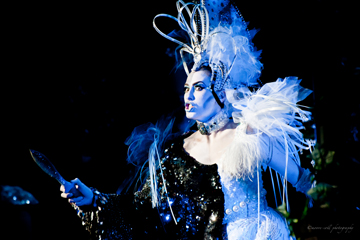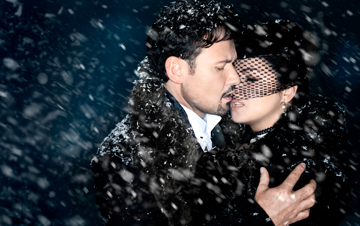Music: Starting a Love Affair: A guide for seeing your first opera
By Mary Burruss
ART TIMES Online July 2013
 Emily Hendrichs as the Queen of the Night in Mozart's Magic Flute from last summer at Ash Lawn Opera. Photo Credit : Janet Moore- Coll |
It is often said that opera is the ultimate art form. It includes music, singing, acting, costuming, lighting and scenery — usually on a grand scale. However, opera is often perceived the lofty pursuit of the upper class, uber-intellectual or extra- artsy. The average opera virgin may also think that opera is slow moving and boring because the story or music is unrelated to modern life. These are, of course, false perceptions but ones, which often intimidate would be opera lovers, robbing them of potential pleasures of immeasurable magnitudes. Cultivating a love for opera is easier than you think. With the right preparation opera virgins may discover a hidden passion that opens up a new and exciting world.
First a little myth busting history:
Opera developed from elaborate musical entertainments (intermezzi) that were sandwiched between acts of Greek dramas performed at parties in the great halls and courtyards of European aristocrats during the sixteenth century. The first opera, Jacopo Peri’s Daphne, performed in 1597, was basically an intermezzi with a singular theme uninterrupted by the customary Greek drama. What is important about this bit of opera history is that the entertainment was meant for a party where people where socializing. “This is how operas were, once upon a time, performed, a casual setting where one could eat and drink and talk and walk around,” says Dr. Christopher Swanson, a music professor at Longwood College. It was spectacle and background like a DJ with a light show at a shindig today. This explains the length, slow moving plot and over-the-top dramatic feel. Opera was originally meant to be ignored in parts, so if you went to get a cocktail then came back to it you could easily pick up the story (daytime dramas have slow moving plot lines for the same reason which is why they are called soap OPERA’s).
Once the first opera house, Teatro San Cassiano in Venice, was built in 1637, opera became popular entertainment like movies are now. The masses went and had a ball, again coming and going in and out of the theatre at will and shouting comments at the performers — sort of like a rock concert. It wasn’t until the late 1700‘s that opera became a stagnantly seated activity for the audience but that is when people came to “see and be seen”. And being “seen” requires dressing to the nines. Audience members even brought little binoculars called opera glasses not so much to see the performers but to ogle each other and to note who was wearing what. Hence the idea that opera is for rich well-dressed people.
Today, audiences are expected to sit quietly as the opera is performed but the fancy dress code is abolished. As far as audience composition goes, yes, there are often smart and/or upper income people attending (many opera companies are working hard to make tickets affordable to all income levels) but most often the person sitting next to you is a lot like Nicholas Cages’ character, Ronny Cammareri in Moonstruck, an average guy or gal who has cultivated an appreciation for the art form.
 Mariusz Kwiecien as Eugene Onegin and Anna Netrebko as Tatiana in Eugene Onegin. Photo by Lee Broomfield Mariusz Kwiecien as Eugene Onegin and Anna Netrebko as Tatiana in Eugene Onegin. Photo by Lee Broomfield |
Preparing for the first time Michelle Krisel, General Director of Ash Lawn Opera in Charlottesville and frequent panelist on The Metropolitan Opera Quiz, says selection of your first opera is important. “Choosing your first opera is like choosing your first love affair, it is going to be memorable,” she muses. “If you could pick any piece in the world it should be La Boheme.” Krisel calls La Boheme, “the entry way drug,” to opera due to the relatability of the characters who are based on composer, Giacomo Pucini’s real life friends and experiences as a starving artist in the 1890’s. It is also coincidentally, the opera Ronny and Loretta see together in Moonstruck and the plot basis for Jonathan Larson’s 1990’s smash hit musical, Rent. Other good starter operas, according to Krisel, are Tosca (Puccini) and Carmen (Bizet). William Berger, Creative Content Producer at the Metropolitan Opera in New York, suggests that the concept of the starter opera is outdated. “The idea of a starter opera is not as relevant as it used to be because people new are exposed to all types of music on a regular basis,” he said in a recent interview. “If it is a good performance people will respond.”
Some people are loath to make the financial and time commitment it takes to try opera. Fortunately there are some good opera films like Francesco Rosi’s Carmen with Placido Domingo and Julia Megenes or the Franco Zeffirelli version of La Traviata Teresa Stratas and Placido Domingo. The Metropolitan Opera also broadcasts its performances all over the world in movie theaters through its Met HD program. This is a brilliant way to see world-class opera with ticket prices about 50% more than the cost of seeing a regular movie in a theatre.
Regardless of how the first opera is chosen, it is a good idea to become familiar with the story, the libretto (lyrics) and music before going if time allows. You can Google almost any opera and get a synopsis and a copy of the libretto to read. If you are pressed for time, fear not, a synopsis is usually provided in the program and subtitles (words of opera projected on a screen above the stage) if the piece is being sung in a language other than English. The Director’s notes often gives an interesting commentary on the concepts behind the production elements like setting the opera in a different time period or costuming choices. Researching the composer, the period in which he/she lived and the period in which the opera is set if applicable may also add to the pleasure of the experience.
Now that it is common for opera singers to have movie star looks, you may also wish to research the singers. Sites like Barihunks.blogspot.com showcase some particularly good-looking baritones. A recent post on Buzzfeed features other singers with model worthy mugs noting that though talent has little to do with looks, the face of opera seems to be changing from the stereotypical full bodied variety to sexy singers. (To see the Buzz feed article : http://www.buzzfeed.com/uhohspaghettio/what-happened-to-opera-9mn7)
During the performance Krisel challenges new comers to listen carefully to the music and reflect on how the notes, time and instruments are utilized to create the intended mood or reflect the emotion of the vocalists. “You are looking for how they are hoping to tell the story is it realistic or symbolic. We do this all the time with movies or TV,” Berger says. “Give it [the opera] some context. For example Aida (Verdi) is the story of a very close love triangle set against the backdrop of warring nations. It is interesting to hear how the individual voices play out against the large groups of singers.”
Attending the opera:
Once the opera has been chosen and a little research accomplished, it might make the first timer more comfortable to understand expected etiquette.
What to wear?
Many people harbor the misconception that formal dress is required of opera patrons. Not true. While opening nights tend to be more formal than other performances attendees are just as likely to be in tuxes as tee shirts. “I follow two simple rules,” says Steven Jarvi, Associate Conductor for the Kansas City Symphony. “No jeans and dress to enjoy. If you’re not one who goes beyond casual Friday attire, no worries just follow rule number one and you’ll be appropriate for 99% of concert experiences.” On the flip side, “If you like getting dressed up – go nuts – whatever matches the kind of experience you’d like to have and makes you feel good,” Jarvi says. If you are attending an outdoor summer festival more casual attire is appropriate but sweats and short shorts are inappropriate.
Oh Behave!
Patrons are expected to be seated a few minutes prior to the opera’s designated start time. Latecomers are seated at a designated seating break indicated by the house staff, usually following the first scene.
Remember to turn off cell phones and any other potential electronic noisemaker, unwrap any candy or cough drops needed during the show and refrain from taking any photos. Phones, wrappers and flashes are distracting to other audience members and the artists. (I sat next to a woman once who texted and checked her emails throughout the performance which was truly annoying to me and other people sitting nearby. Don’t be the inconsiderate patron who gets called on the carpet in someone’s blog.) Talking during the performance is also a big faux pas.
When to applaud
Opera singers adore applause and expect plenty of it and may even take a curtain call in the middle of the show. Customs vary regarding when applause should happen so it is smart to take cues from the rest of the audience. It is also normal, when you like a singer or singer's performance to shout “Bravo” for men and “Brava” for women, “Bravi” for multiple singers simultaneously. “Opera was popular entertainment so opera behavior is like a baseball game where people go wild, they throw tomatoes, they cheer, they boo — anything goes,” says Krisel. “There is no right or wrong or correct behavior.” However, sometimes applause is expected. Krisel explains, “There are natural closure s at the end of arias which are designed for applause and if the singer didn’t get applause they would be really upset.” Other times to applaud are when the conductor emerges to begin the overture, at the end of each act, before intermission and at the end of the show when the singers come out to take bows.
Now comes the best part — actually experiencing the production. Krisel waxes about the visceral connections between our modern lives and opera, “It’s about real people and real emotions which is the reason why it is still popular 300 years later, because it is about you and me.” Any way you experience it, opera is worth at least one good-hearted try.
This is a link to the Met HD program schedule:
Met hd link: http://www.metoperafamily.org/metopera/liveinhd/LiveinHD.aspx
Share |
